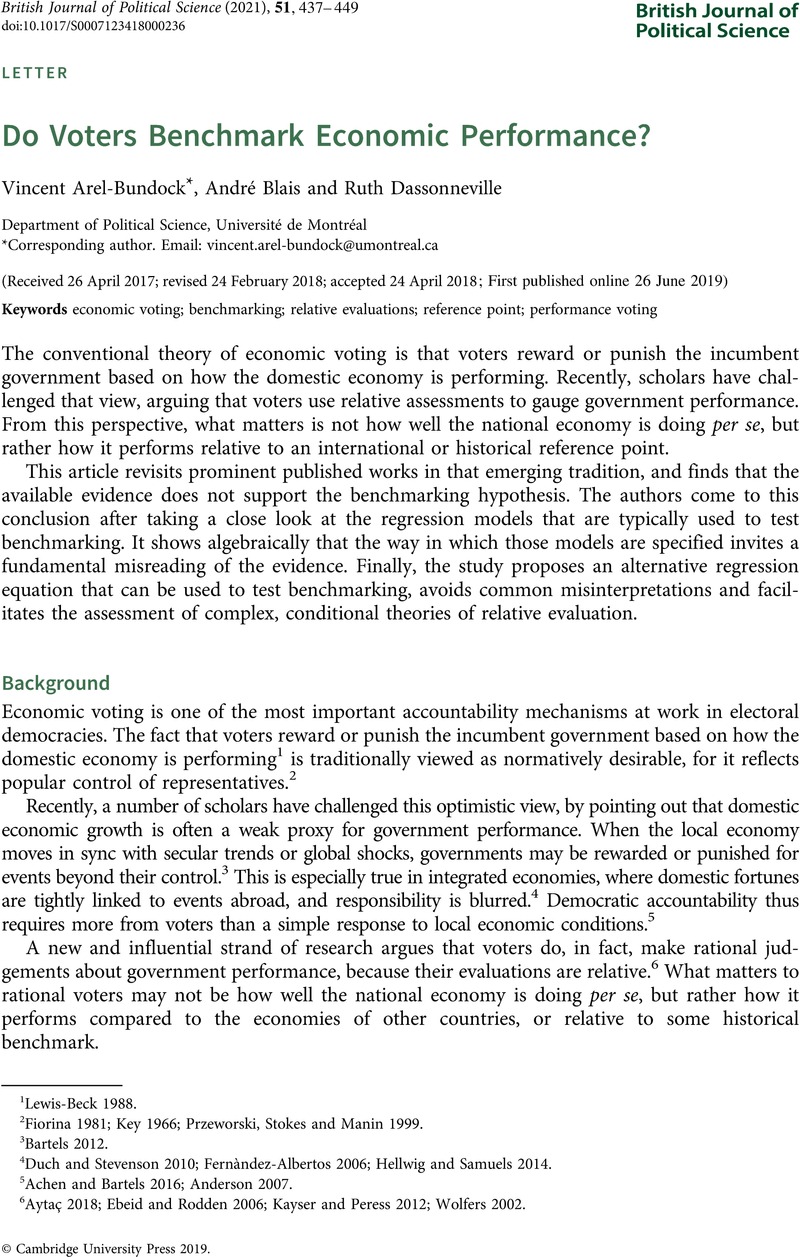Crossref Citations
This article has been cited by the following publications. This list is generated based on data provided by Crossref.
Auberger, Antoine
2019.
The impact of economic and political factors on popularity in France (1981–2017).
French Politics,
Vol. 17,
Issue. 4,
p.
451.
Markwat, Niels
2021.
The policy-seeking voter: evaluations of government performance beyond the economy.
SN Social Sciences,
Vol. 1,
Issue. 1,
Dash, Bharatee Bhusana
and
Ferris, J Stephen
2021.
Economic performance and electoral volatility: Testing the economic voting hypothesis on Indian states, 1957–2013.
Party Politics,
Vol. 27,
Issue. 6,
p.
1105.
Hart, Austin
and
Matthews, J. Scott
2022.
Unmasking Accountability: Judging Performance in an Interdependent World.
The Journal of Politics,
Vol. 84,
Issue. 3,
p.
1607.
Hobolt, Sara B
Popa, Sebastian Adrian
Van der Brug, Wouter
and
Schmitt, Hermann
2022.
The Brexit deterrent? How member state exit shapes public support for the European Union.
European Union Politics,
Vol. 23,
Issue. 1,
p.
100.
Giuliani, Marco
2022.
Absolute and Benchmarked Economic Voting. A Subnational Perspective on a Decade of Elections in Southern Europe.
South European Society and Politics,
Vol. 27,
Issue. 2,
p.
279.
Giuliani, Marco
2023.
Voting between two global crises. A NUTS3-level analysis of retrospective voting in four South-European countries.
Italian Political Science Review/Rivista Italiana di Scienza Politica,
Vol. 53,
Issue. 1,
p.
68.
Park, Brandon Beomseob
2023.
How Does a Relative Economy Affect Voter Turnout?.
Political Behavior,
Vol. 45,
Issue. 3,
p.
855.
Brännlund, Anton
and
Szulkin, Jan
2023.
How does a growing wealth gap affect voting? – Evidence from Sweden.
Electoral Studies,
Vol. 85,
Issue. ,
p.
102647.
Choi, Chi-Young
Quigley, David
and
Wang, Xiaojun
2023.
The Impacts of Local Housing Markets on U.S. Presidential Elections: Via the Collateral Channel.
SSRN Electronic Journal,
Markwat, Niels
2023.
Not as expected: the role of performance expectations in voter responses to election pledge fulfilment.
European Political Science,
Vol. 22,
Issue. 3,
p.
308.
Park, Brandon Beomseob
2023.
How does economic openness affect the relative economic voting?.
European Political Science Review,
Vol. 15,
Issue. 4,
p.
562.
Crombach, Lamar
and
Bohn, Frank
2024.
Uninformed voters with (im)precise expectations: Explaining political budget cycle puzzles.
Economics & Politics,
Vol. 36,
Issue. 1,
p.
275.
Shen, Zekai
Jin, Yiyang
Dong, Yuanyuan
and
Liu, Yazhou
2024.
Economic voting behavior: The peak‐end growth rule.
Economics & Politics,
Vol. 36,
Issue. 3,
p.
1537.
Allen, William L.
and
Ahlstrom-Vij, Kristoffer
2024.
Worst of the Bunch: Visual Comparative Benchmarks Change Evaluations of Government Performance.
Comparative Political Studies,
Becher, Michael
Brouard, Sylvain
and
Stegmueller, Daniel
2024.
Endogenous Benchmarking and Government Accountability: Experimental Evidence from the COVID-19 Pandemic.
British Journal of Political Science,
Vol. 54,
Issue. 2,
p.
355.
Rombi, Stefano
and
Valbruzzi, Marco
2024.
Economic voting goes local: evidence from the Italian regions.
Italian Political Science Review/Rivista Italiana di Scienza Politica,
Vol. 54,
Issue. 1,
p.
54.
Pannico, Roberto
and
Lobo, Marina Costa
2024.
Voting under EMU: economic perceptions, responsibility attribution and EU politicisation..
Journal of European Public Policy,
Vol. 31,
Issue. 2,
p.
501.
Schraff, Dominik
and
Pontusson, Jonas
2024.
Falling behind whom? Economic geographies of right-wing populism in Europe.
Journal of European Public Policy,
Vol. 31,
Issue. 6,
p.
1591.



